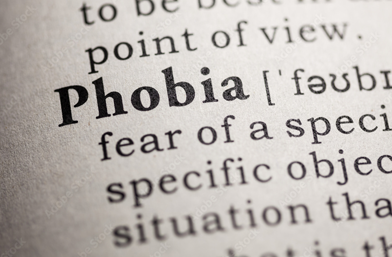About Phobias
Anxiety disorders can often take the form of phobia, an intense, often irrational fear of a specific thing, situation, or environment.
Don’t let a specific fear convince you that you suffer alone. Specific phobias affect up to ten percent of the U.S. population, with still others experiencing more generalized phobias.
You can benefit from learning some basic facts about phobias, from the kinds of fears people develop to the available treatment methods for this disorder. Check out these answers to frequently asked questions about phobias.

How Do Phobias Differ From Ordinary Fears?
Fear plays an important, positive role in human preservation.
When your brain perceives a genuinely dangerous or threatening situation, your body goes into fight-or-flight mode, processing stress hormones that help you react quickly and get out of harm’s way. These ordinary, justified responses pass as the actual threat passes.
By contrast, a phobia involves uncontrollable, unreasonable fear and agitation over things that pose little or no actual threat. The phobia may occur every time the person experiences this stimulus. Sufferers may structure their entire everyday routine around avoiding phobia triggers, to the point of severely limiting their quality of life.
What Kinds of Phobias Do People Commonly Develop?
Three primary categories of phobia include specific phobia, social phobia, and agoraphobia.
A specific phobia can prove easy to diagnose because it always occurs in response to one specific trigger. Common examples include acrophobia (fear of heights) and claustrophobia (fear of confined spaces).
Social phobia
Social phobia can encompass a broader range of triggers, all related to intense anxiety in public environments. This kind of phobia typically centers around fear of public embarrassment or rejection. Sufferers from social anxiety may avoid public gatherings, speaking opportunities, and other such occasions at all costs.
Agoraphobia
Agoraphobia involves a fear of environments that offer little chance of escape from danger. Some sufferers may experience agoraphobia when they go out into large, open areas, while others may feel it inside a locked room or moving elevator.
Both social phobia and agoraphobia belong to a larger class of phobias known as complex phobias. They may occur only under certain, infrequent circumstances, potentially making them harder to detect and diagnose than specific phobias with clear, common triggers.
What Symptoms and Behaviors Might Indicate a Phobia?
As an anxiety disorder, you can expect a phobia to cause many of the same symptoms associated with other types of anxiety or panic issues.
You may experience:
- tingling sensations
- breathing difficulties
- rapid heartbeat
- sweating
- dizziness
- nausea
- chills
- trembling
- flushing
- or a choking sensation
A phobia trigger will also cause you to experience sudden, uncontrollable fear accompanied by a desperate urge to eliminate or flee from the trigger. You may find it impossible to think about anything else, even if you recognize the fear as irrational and the threat as unreal.
How Can Therapy Treat Phobias?
Cognitive behavioral therapy (CBT) can help you gain greater control over your responses to phobia triggers.
Your therapist may recommend individual therapy, group therapy, or a combination of both. Treatment focuses on helping you recognize negative thoughts and replace them with calmer, more positive responses.
Exposure therapy often plays a major role in overcoming a phobia. In this approach, patients expose themselves to a phobia trigger a little bit at a time, mastering smaller degrees of exposure as stepping stones to periods of longer or more direct exposure. eventually, the phobia trigger loses its power to provoke anxiety.
When Does Medication Make Sense for Phobia Management?
Certain medications may reduce phobia symptoms by treating underlying chronic anxiety.
Your therapist may prescribe options such as beta-blockers, tranquilizers, or antidepressants depending on the nature of your symptoms, disorder, and baseline health.
While medication can tone down the intensity of your phobia responses, drugs alone cannot make a phobia go away. Instead, you would use these medications as an accompaniment to your CBT program.
Anxiety Institute can answer your questions about phobias and help you overcome phobias that you may have developed. Contact us today to schedule a consultation.
“My personal knowledge and experience of anxiety and fear, as a victim and as a conqueror, has gifted me the valuable asset of emotional intelligence. Knowledge and experience that will give me the empathy to connect with others and the grit to overcome adversity.”


